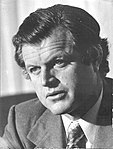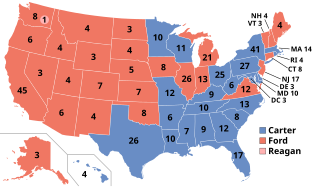
Presidential elections were held in the United States on November 2, 1976. The Democratic ticket of Jimmy Carter, the former governor of Georgia, and his runningmate Walter Mondale, the senior senator from Minnesota, narrowly defeated the Republican ticket of Gerald Ford, the incumbent president, and his runningmate Bob Dole, the junior senator from Kansas. This was the first presidential election since 1932 in which the incumbent was defeated, as well as the only Democratic victory of the six presidential elections between 1968 and 1988.

Presidential elections were held in the United States on November 4, 1980. Republican nominee, former California governor Ronald Reagan, defeated incumbent Democratic President Jimmy Carter in a landslide victory. This was the second consecutive election in which an incumbent president was defeated, although Gerald Ford assumed the presidency after President Richard Nixon resigned and was not elected, as well as the first election since 1888 that saw the defeat of an incumbent Democratic president.

Each of the 50 U.S. states, the District of Columbia, and five territories of the United States holds either primary elections or caucuses to help nominate individual candidates for president of the United States. This process is designed to choose the candidates that will represent their political parties in the general election.

The New Hampshire presidential primary is the first in a series of nationwide party primary elections and the second party contest, the first being the Iowa caucuses, held in the United States every four years as part of the process of choosing the delegates to the Democratic and Republican national conventions which choose the party nominees for the presidential elections to be held in November. Although only a few delegates are chosen in the New Hampshire primary, its real importance comes from the massive media coverage it receives, along with the first caucus in Iowa.
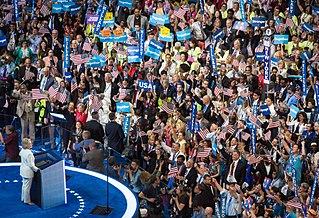
The Democratic National Convention (DNC) is a series of presidential nominating conventions held every four years since 1832 by the United States Democratic Party. They have been administered by the Democratic National Committee since the 1852 national convention. The primary goal of the Democratic National Convention is to officially nominate a candidate for president and vice president, adopt a comprehensive party platform, and unify the party. Pledged delegates from all fifty U.S. states, the District of Columbia, and the American territories, and superdelegates which are unpledged delegates representing the Democratic establishment, attend the convention and cast their votes to choose the party's presidential candidate. Like the Republican National Convention, the Democratic National Convention marks the formal end of the primary election period and the start of the general election season. Since the 1980s, national conventions have become mostly inaugural events for the winning candidate, since winners are announced long before the convention. In 2020, both major parties, and many minor parties, replaced their usual in-person conventions with virtual programs due to the COVID-19 pandemic.

The 1980 Democratic National Convention nominated President Jimmy Carter and Vice President Walter Mondale for reelection. The convention was held in Madison Square Garden in New York City from August 11 to August 14, 1980.
In U.S. politics, a primary challenge is when an incumbent holding elective office is challenged by a member of their own political party in a primary election. Such events, known informally as "being primaried," are noteworthy and not frequent in the United States, as traditionally political parties support incumbents, both for party unity and to minimize the possibility of losing the seat to an opposing party. In addition, officeholders are frequently seen as de facto leaders of their party, eligible to establish policy and administer affairs as they see fit. A primary challenge thus interferes with this "spoil of office," and is largely discouraged. Though typically used to describe challenges to elected officials, the term is also applied to officeholders such as appointed U.S. senators.

From January 21 to June 3, 1980, voters of the Democratic Party chose its nominee for president in the 1980 United States presidential election. Incumbent President Jimmy Carter was again selected as the nominee through a series of primary elections and caucuses, culminating in the 1980 Democratic National Convention, held from August 11 to 14, 1980, in New York City.
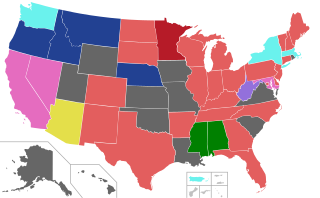
From January 27 to June 8, 1976, voters of the Democratic Party chose its nominee for president in the 1976 United States presidential election. Former Georgia governor Jimmy Carter was selected as the nominee through a series of primary elections and caucuses culminating in the 1976 Democratic National Convention held from July 12 to July 15, 1976, in New York City.

From January 21 to June 28, 1980, voters of the Republican Party chose its nominee for president in the 1980 United States presidential election. Retired Hollywood actor and two-term California governor Ronald Reagan was selected as the nominee through a series of primary elections and caucuses culminating in the Republican National Convention held from July 14 to 17, 1980, in Detroit, Michigan.
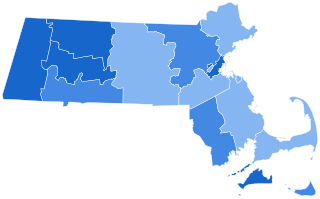
The 2008 United States presidential election in Massachusetts took place, as in all 50 states and D.C., as part of the 2008 United States presidential election of November 4, 2008. Voters chose 12 representatives, or electors to the Electoral College, who, in turn, voted for the office of president and vice president.
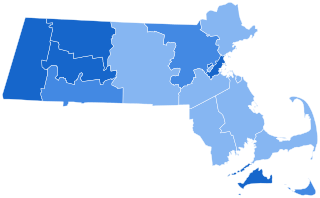
The 2012 United States presidential election in Massachusetts took place on November 6, 2012, as part of the 2012 United States presidential election in which all 50 states plus the District of Columbia participated. Massachusetts voters chose 11 electors to represent them in the Electoral College via a popular vote pitting incumbent Democratic President Barack Obama and his running mate, Vice President Joe Biden, against Republican challenger and former Massachusetts Governor Mitt Romney and his running mate, Congressman Paul Ryan.

The 1980 United States presidential election in Massachusetts took place on November 4, 1980, as part of the 1980 United States presidential election, which was held throughout all 50 states and D.C. Voters chose 14 representatives, or electors to the Electoral College, who voted for president and vice president. By an exceptionally narrow margin, Massachusetts was carried by the Republican nominee, former Governor Ronald Reagan of California, over incumbent Democratic President Jimmy Carter of Georgia. Also contesting the state was independent candidate Congressman John B. Anderson of Illinois, who won an unexpectedly solid 15.15%, mostly from disaffected Democratic voters.

The 1980 United States presidential election in Illinois took place on November 4, 1980. All 50 states and The District of Columbia, were part of the 1980 United States presidential election. State voters chose 26 electors to the Electoral College, who voted for president and vice president. Illinois voters chose between the Democratic ticket of incumbent president Jimmy Carter and vice president Walter Mondale, and the Republican ticket of Ronald Reagan and running mate George H. W. Bush, as well as the independent candidacy of John B. Anderson and running mate Patrick Lucey.

The 1976 United States presidential election in Illinois was held on November 2, 1976. All 50 states and The District of Columbia, were part of the 1976 United States presidential election. State voters chose 26 electors to the Electoral College, who voted for president and vice president.
American Samoa Democratic Party is the American Samoa affiliate of the U.S. Democratic Party. It is based in the territorial capital of Pago Pago.

The 2024 American Samoa Democratic presidential caucuses were held on March 5, 2024, as part of the Democratic Party primaries for the 2024 presidential election. 11 delegates to the 2024 Democratic National Convention will be allocated to presidential candidates. The contest was held on Super Tuesday alongside primaries in 14 other states and territories.

The 1980 Iowa Democratic presidential caucuses were held on January 21, 1980, as part of the Democratic Party primaries for the 1980 United States presidential election. 200 total pledged delegates to the 1980 Democratic National Convention were allocated to presidential candidates. Incumbent President Jimmy Carter won the contest.

In the 1980 United States presidential election, incumbent president Jimmy Carter and incumbent vice president Walter Mondale were defeated by Republican presidential nominee Ronald Reagan and vice presidential nominee George H. W. Bush.

